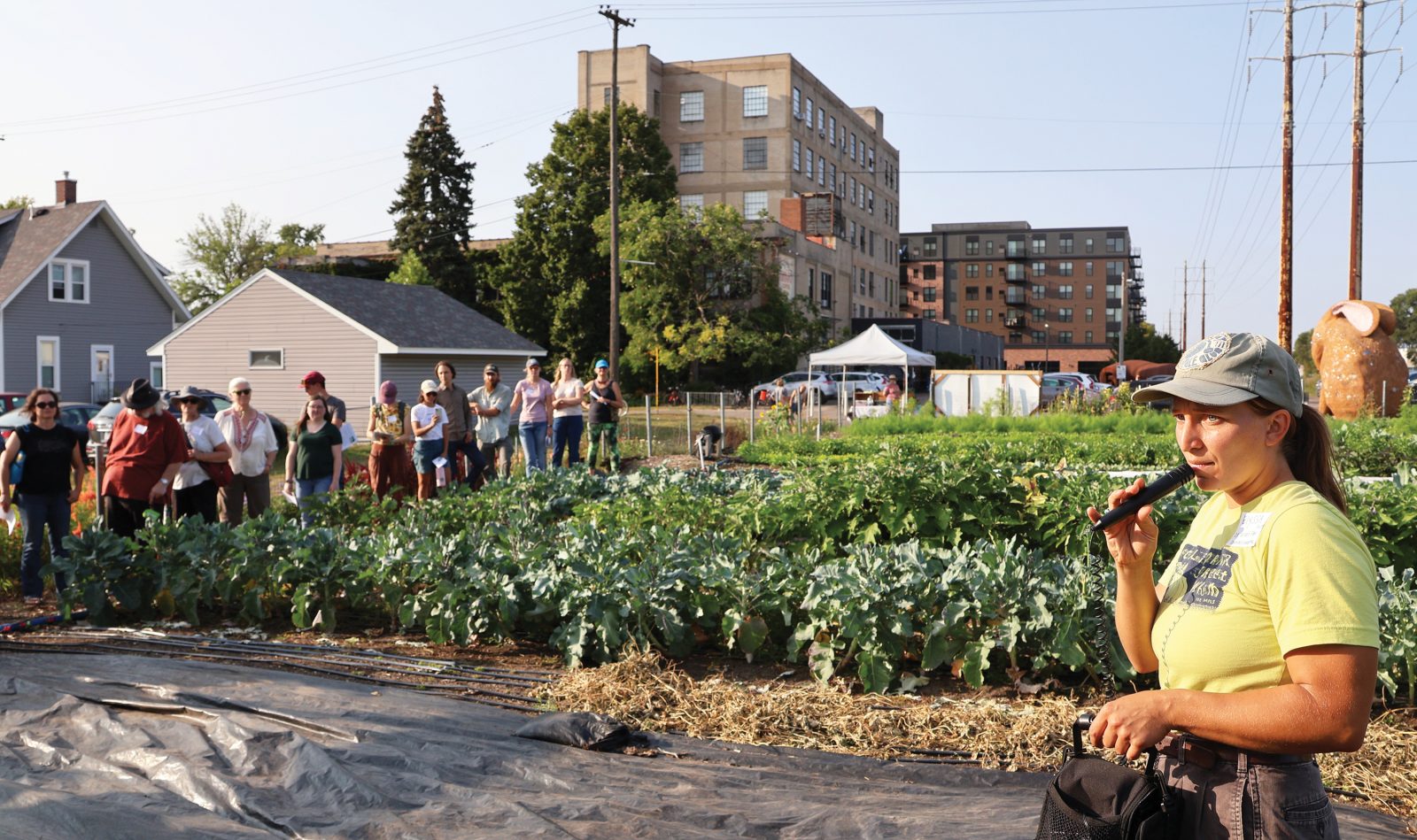Note: This is the 6th installment in the 12-part “A Sense of Where You Are” series.
When your context is farming in the city, everything is a little faster, denser, and louder.
“We grow everything very intensively,” said Elyssa Eull on a warm evening in early September while she stood near the entrance to California Street Farm, an urban vegetable operation that grows food on a third-of-an-acre. As she said this, a BNSF train engine rolled by a few yards away.

Aspiring and newbie farmers had gathered here on this particular day to see how this Northeast Minneapolis operation was able to make a go of it on land tucked between a set of railroad tracks and an open lot, just across the street from a collection of artist spaces called the California Building. The event was being put on by the Twin Cities Metro Growers Network, which is an initiative of the Sustainable Farming Association.
During the field day, staffers with the University of Minnesota’s Extension Service, as well as the local office of the NRCS and the USDA’s Farm Service Agency, were on-hand to share information on resources available to farmers raising food in urban areas. As she provided a tour of the well-tended vegetable plots and two hoop houses she uses to raise over 50 varieties of vegetables, Eull fielded questions about soil health, fertility issues, government cost-share funding that’s available, and the economics of producing food in the city. It was clear the field day participants were here to learn how to make a go of it in agriculture, even if the setting was concrete and curbs, rather than fields and fencelines.
During the 2024 growing season, the farm had 37 Community Supported Agriculture (CSA) shares and marketed produce through a farmstand set up next to the plots, as well as via the Northeast Minneapolis Farmers’ Market. Eull, who’s 30, makes enough during the growing season to pay two part-time employees and to support herself. But she didn’t sugarcoat it: urban agriculture comes with plenty of potholes, particularly when it comes to soil health.
“Because it’s such a small area, the challenges I’m experiencing with soil health are quickened,” she said. “It’s like in one year I have three years of accumulation of disease, or stress, or using up those nutrients.”
The farmer has responded by focusing on utilizing cover crops and low-till methods to build the soil’s resiliency. Eull also removes the plastic from the hoop houses periodically so that natural precipitation can dilute salts that tend to accumulate in the soil.
Eull, who is a graduate of LSP’s Farm Beginnings course, feels she has the confidence to tackle such problems because raising food in the city on a commercial basis is starting to be taken more seriously. She’s benefited greatly from U of M Extension research and NRCS conservation cost-share programs that have in the past been mostly directed at bigger row crop farmers in rural areas. For example, one of her hoop houses was funded by the Environmental Quality Incentives Program (EQIP), an initiative of the NRCS.
“I think there’s a real awareness of urban farming being real farming,” said Eull as she headed over to California Street’s farmstand on a nearby street corner, brimming with late-summer bounty.
Brian DeVore edits the Land Stewardship Letter and produces the Ear to the Ground podcast.
Give it a Listen
- Ear to the Ground 348: Urban Agrarian (Elyssa Eull)
Installments in the ‘A Sense of Where You Are’ Series:
- Introduction to the Series: A Sense of Where You Are
- Red Dresses & Magic Management
- In the Blood
- Seeking Signs of Life
- Forest for the Trees
- The Quickening
- Food Bank Booster
- First Things First
- The Big Picture
- The Snowball Effect
- 7 Years Later
- Against the Grain